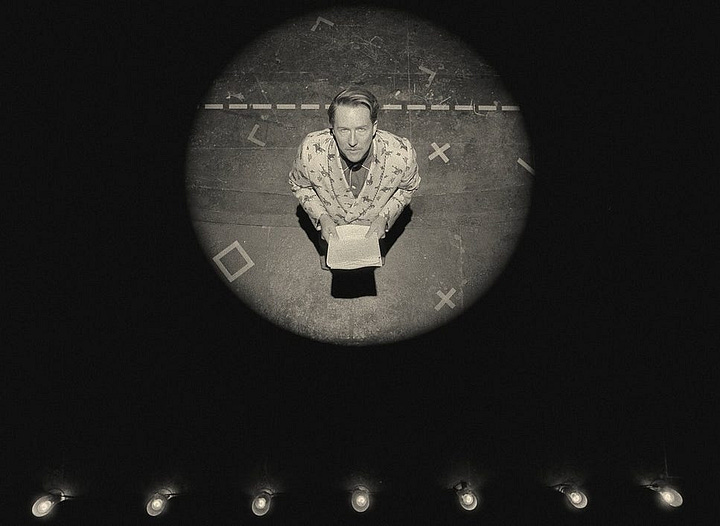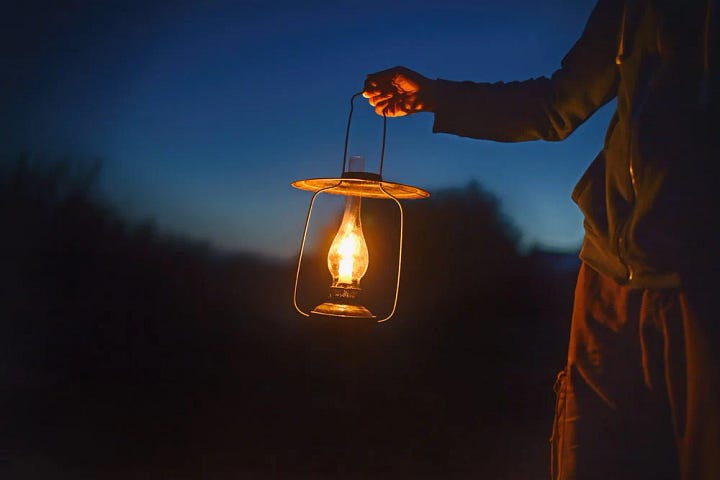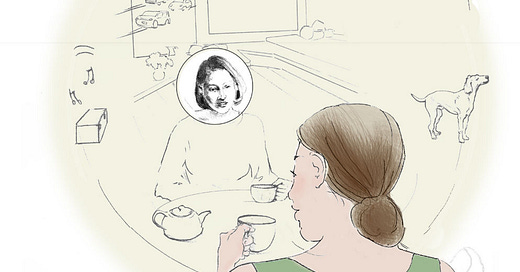I don’t know about you, but my attention seems to be getting weaker every day. How about you?
It’s not your fault—no one can pay attention like they used to. We now live in an attention economy. Every corporation, politician, and influencer on the planet is in an arms race to capture one of the most precious resources in existence: our attention.
I think we all know that something we used to have has been lost, and some of us are taking steps to get it back. But, in my opinion, most of these steps are heading in the wrong direction.
I wrote this essay to help you regain your attention. But in order to do so, I’m going to rely on a surprising finding: attention improves when you use it less. Specifically, I want to show you how to shift from a limited resource (attention) to a limitless one (awareness). In my experience, living from awareness is not just good for your attention—it’s good for your life.
The lantern and the spotlight
Let’s start with an analogy. Picture a spotlight and a lantern.


Attention is like a spotlight. Both select an object, focus on it, and exclude everything else. For example, you’re (ideally) paying attention to these words. Because your attention is directed here, you’re mostly (or entirely) excluding the sounds of the space you're in, the sensation of your breath at your nostrils, and the visual objects around you. Attention, like a spotlight, is inherently selective.
Awareness is like a lantern. Both illuminate all phenomena in their vicinity without preference. For example, even if you’re not paying attention to the sounds, sights, and sensations I just mentioned, the fact that you can access them means they are in your awareness. Awareness, like a lantern, is inherently inclusive.
In every moment of experience, we use a mix of attention and awareness to interact with our environment. Everything we experience first arises in our awareness. If it is of interest—which usually means especially attractive or threatening—we direct our attention towards it. It remains our object of attention until something else interesting captures our attention.
In this image, the woman in green is paying attention to her conversation partner while simultaneously aware of everything in the shaded circle. If the dog were to bark, or the tea were to scald her lip, she’d immediately (and likely unknowingly) shift her attention there.
Now, are you ready to experience the difference for yourself?
Exercise: attention vs. awareness
□ Looking around the room, select a single object to pay attention to.
□ Using your attention, closely examine its details for a few moments.
□ Notice how paying attention feels. Is it effortful? Intentional?
□ Now, relax. Don't pay attention to anything in particular.
□ Allow the whole of your experience to present itself in awareness.
□ Confused? Try one of these pointers:
Visual: Defocus your eyes a bit. Look at the periphery of your vision.
Auditory: Listen to sounds around you as if through stereo headphones.
□ When attention contracts, gently expand to the whole of awareness.Did you observe a difference between the two? Was something confusing? I’d love to hear in either case.
The cost of attention
Here’s the thing about attention: it comes at a cost.
If you’ve ever talked to a dull conversation partner, you know that attention is a limited resource. Is it any wonder we use language like I’m struggling to pay attention to you right now, or Do you know what captured my attention last night? Or that we feel so drained after a day of sedentary, but attention-demanding, work? Attention requires effort.
On the other hand, awareness requires no effort. Think about it: could you, if you wanted to, spend even a moment not being aware? No! Whatever appears in awareness does so whether we try or not.
This is why I feel that our solution to our attention crisis is not cultivating more attention, but less. To switch from an attention-based operating system to an awareness-based one. To put it provocatively:
Stop paying attention. Start raising awareness.
Ever been in one of these scenarios?
You were worrying about that behind-schedule project while your partner was telling you about their day—and, from the look on their face, they know it.
You’ve doomscrolled for two hours, and your attention span is basically nonexistent.
Someone recommends you meditate to relieve stress, but, try as you might, you cannot stay focused on your stupid breath.
Someone asks you the name of your friend’s spouse. You can’t recall it, and panic.
In each of these cases, the classic solution would just be to try harder, pay more attention. Pay attention to your partner. Do something productive. Focus on the breath. Rack your brain for the name.
But in each case, the very effort to contract your attention onto the intended object just excludes everything else, making things harder than before. What if, paradoxically, the best option were to relax the attention? To try less?
Resting in awareness
A couple of years ago, I asked a teacher and friend of mine for some meditation instruction. He sent me this:1
Don’t recall.
Don’t imagine.
Don’t think.
Don’t examine.
Don’t control.
Rest.When I read this, I almost threw my phone across the room in anger.
I was, at the time, a Very Serious Meditator™. Whatever was happening in my meditation, and in my life, was the product of my hard work, not my relaxation. I wasn’t going to get anywhere if I rested. But, finding myself in each of the four situations described above, I reluctantly tried his advice.
I made no effort to remember a name—and I remembered it faster than ever.
I actively let go of the breath in meditation—and it became smoother than ever.
I didn’t pay attention to anything when I felt overstimulated—and I became more observant than ever.
I refrained from focusing as people talked to me—and became more responsive to them than ever.
And, to sweeten the deal, I started creative projects with no idea where they’d take me—and found myself producing my best work to date.
For an analogy to make sense of the technique, consider your phone’s camera. Many smartphones these days have a few different lenses, each with different levels of magnification. Constantly using your attention without resting in awareness would be like shaking the camera while zoomed all the way in. You’d exhaust yourself, and you’d never see the whole picture.
On the other hand, if you rest in awareness but selectively dispatch attention, that would be like staying at 1x magnification but zooming in selectively. There would be less frantic movement and you would remain anchored in the big picture while still getting the close-ups you need.
I’ve been practicing this method2 for several years now, and my baseline way of relating to the world has gradually changed. Rather than contracting my attention into whatever seems threatening or attractive in the moment, I am content to just be until I am needed. This isn’t tuning out, because resting in awareness enables me to respond more quickly to the world than when my attention is captured by something else.
As a result, I have a larger reservoir of creativity, memory, presence, empathy, and—yes—attention than ever before. By caring less about attention, I ended up with more of it in the long run.
Recap
Attention is like a spotlight. It selects one object in awareness and excludes everything else. It takes effort to keep your attention on an object.
Awareness is like a lantern. It illuminates all phenomena equally and requires no effort.
Both in meditation and in life, try to rest in awareness rather than be constantly captured by attention.
To move from attention to awareness, relax your contraction around the object of attention and expand into the open field in which all experience arises. Reach out if you have any questions!
Thanks for your attention. 😊
Rey
This is from Tilopa's Six Words. If we expand on each line, it reads:
Let go of what has passed.
Let go of what may come.
Let go of what is happening now.
Don’t try to figure anything out.
Don’t try to make anything happen.
Relax, right now, and rest.





![url_upload_684bcfa8ea0f7.gif [rotate output image] url_upload_684bcfa8ea0f7.gif [rotate output image]](https://substackcdn.com/image/fetch/w_1456,c_limit,f_auto,q_auto:good,fl_lossy/https%3A%2F%2Fsubstack-post-media.s3.amazonaws.com%2Fpublic%2Fimages%2F3e154e19-7d63-4008-9238-c6a9e08d34b4_480x222.gif)
Thanks for these timely reminders!
Oddly, I had the opposite reaction to Tilopa's Six Words the first time I heard them. For me, relaxing onto the cushion, 'sitting all the way down' and 'there is nothing else to do' started as a welcome refuge from all the 'doing' in my life, and I'm slowly learning to bring that attitude off the cushion as well (effortless action is a term that comes to mind; also, flow). Perhaps because I first came to meditation via a Pagan path, where Very Serious Meditators aren't as common?
"I am content to just be until I am needed. This isn’t tuning out, because resting in awareness enables me to respond more quickly to the world than when my attention is captured by something else." Reminds me of my pets - particularly the cats. Even when focused/stalking, they retain situational awareness and can turn on a dime.
Outstanding- the principles are clearly outlined, and the various examples land squarely!
Love when someone else explains how and why something works for me in novel ways. May steal significant chunks. With credit.